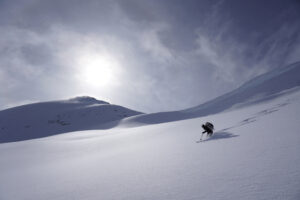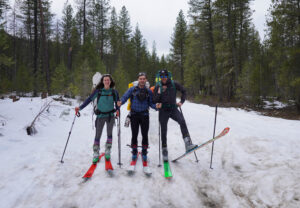
Exploration
The 2022 Expedition Insider
A behind-the-scenes look at the adventures and discoveries of the passionate explorers funded by the Royal Canadian Geographical Society
- 3864 words
- 16 minutes
People & Culture

The Royal Canadian Geographical Society is supporting a stellar lineup of eight 2022 expeditions, including this ski traverse of B.C.’s Monashee Mountains. The team, which includes Mark Grist, Douglas Noblet, Isobel Phoebus and Stephen Senecal, has charted a 500-plus kilometre route that starts in Grand Forks and ends near Valemount. They estimate the expedition, set to begin in April, will take up to 42 days.
After skiing 2,015 kilometres in six months (no typos, you read that correctly) as a part of the first complete Coast Range ski traverse in 2001, the late, great Guy Edwards said that for every day you spend on a trip, you’ll spend at least one day (either before or after the trip) planning logistics or demobilizing, and thanking all the kind people who helped you along on your pilgrimage.
Expeditions are a lot of work, before you even leave home. One of the more interesting aspects of the pre-trip planning is getting all your food ready. I used to have a rough rule of thumb that one month of food would fill a shopping buggy, produce a receipt as long as my arm, and cost about $350. These days, I eat just as much, but that shopping buggy full of groceries costs about $550 (yes, inflation is real in 2022).
The place to buy camping food in Vancouver, B.C., is still Famous Foods — 1595 Kingsway — I have that address memorized because I’ve been there so many times. What makes this place so great is not only their house brand minimalist packaging (clear plastic) in very convenient sizes, but also the wide range of specialty foods they stock (particularly dried fruit and freeze-dried items).
The next step is to take over an entire room, making tidy piles for all your food drops. So how much food do you eat on a backcountry trip and how much does it weigh? Well, another rule of thumb is that each day of food and fuel will weigh approximately one kilo per person, so we try to limit the length of each leg of a ski traverse to 3-7 days if logistically possible. Once the tidy piles are rounded up, all trip members meet to pool together our food and place the various legs’ stashes in plywood boxes. Each box then gets placed out in the middle of nowhere (but in the line of our traverse). The box keeps our food safe from rodents (or larger animals).
Reaching a food cache is usually a joyous occasion. It’s nice to have a few treats stashed away in there, too. A bonus of plywood boxes is that we can burn it and have a cheery fire while we enjoy a fresh round of (likely the same) groceries. Yum!




Are you passionate about Canadian geography?
You can support Canadian Geographic in 3 ways:

Exploration
A behind-the-scenes look at the adventures and discoveries of the passionate explorers funded by the Royal Canadian Geographical Society

Environment
They sustain us, enrich our lives and inspire us

Exploration
Reflecting on an epic 600-kilometre ski traverse across the southeastern B.C. range and charting human and wildlife activity along the way

People & Culture
Celebrating new partnerships, milestone anniversaries and a bird for Canadians on geography's biggest night